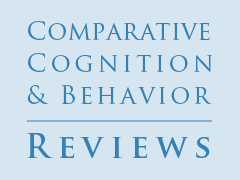Looking to the Future: What Is to Come for Comparative Cognition?
In last year’s volume, we devoted some pages to reminisces. It was the 30th annual Conference on Comparative Cognition (CO3), and it struck us that certain stories from bygone years would be worth sharing. As it turns out, it was also the end of an era. We now find ourselves in new environs after decades of holding the annual meeting in Florida. At the time of this writing, we can only hope that Albuquerque in 2024 will be as hospitable as Melbourne was for many years. The change in venue serves as a reminder of the ubiquity of change, and perhaps allows us to wonder what other changes might be in store for ourselves and for our science. Thus, in a special call for papers, we asked the community to consider the future of our discipline. The response was enthusiastic. We received more than two dozen brief submissions regarding the future of comparative cognition. In this year’s volume of Comparative Cognition & Behavior Reviews, we have included 22 commentaries on a wide range of topics. This brief introduction to the special issue will serve to orient you to the contents of the issue.
Perhaps expectedly, with so many articles, we found that authors addressed several overarching themes. These seem to us to best represent the chief matters as pertains to the future of our field. We elected to categorize manuscripts according to these themes so as to organize the issue in a sensible fashion. This process was undertaken by us, the editors, and does not reflect any explicit input of any authors—we bear all responsibility for the following roadmap. The themes of the 2024 volume are as follows:
- Welfare and Conservation
- Nontraditional Animal Models
- Philosophy of Science
- Scientific Practices
- Scientific Outreach
Overall, the articles share one major point: In the future, comparative cognition needs to be, and will be, broader in scope and impact. The future will include a greater variety of species (encompassing both a greater variety of phylogenetic taxa and range of behaviors) and a greater applicability to welfare and conservation. Paradigms used will depend on interdisciplinarity (e.g., computational, developmental, and neuroscientific methods), rely on large-scale collaborations, and may use longitudinal approaches. Those conducting the research will change as well; comparative cognition research is likely to involve more undergraduate students and citizen science approaches. The field of comparative cognition will also take into account reevaluations of what constitutes cognition, how best to compare species, and considerations that cognition needn’t be “humanlike.” Together, the articles paint an exciting picture of the kind of progress and impact we might expect from the field in the coming decades.
As always, we must thank Ali Qadri and Moriah Deimeke for their tireless efforts on the publishing side. The journal could not possibly function without their work. Next year, we will return to our usual programming. We will seek original contributions, including substantive and brief reviews of the literature, constructive critiques, innovations in comparative cognition, and instructional articles (for details on each article type, please see https://comparative-cognition-and-behavior-reviews.org/for-authors/). Please do reach out to us if you are interested in publishing your work at CCBR. If you have a preliminary sense for a paper but are not sure whether it is appropriate for CCBR, we may have ideas about how to reach the journal’s readers, which can help you as you prepare your manuscript. Finally, an enormous thanks to all the authors who contributed to the work in this year’s volume. We hope that the readership finds these articles to be incisive and useful for their own scientific pursuits.
Sincerely,
The Editors
W. David Stahlman
Marisa Hoeschele

